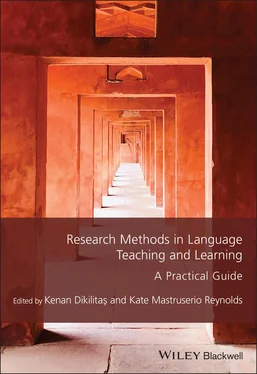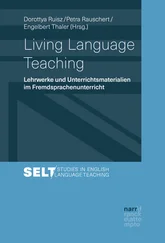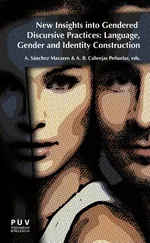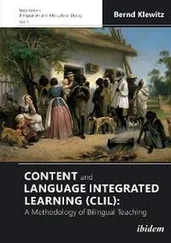Research Methods in Language Teaching and Learning
Здесь есть возможность читать онлайн «Research Methods in Language Teaching and Learning» — ознакомительный отрывок электронной книги совершенно бесплатно, а после прочтения отрывка купить полную версию. В некоторых случаях можно слушать аудио, скачать через торрент в формате fb2 и присутствует краткое содержание. Жанр: unrecognised, на английском языке. Описание произведения, (предисловие) а так же отзывы посетителей доступны на портале библиотеки ЛибКат.
- Название:Research Methods in Language Teaching and Learning
- Автор:
- Жанр:
- Год:неизвестен
- ISBN:нет данных
- Рейтинг книги:5 / 5. Голосов: 1
-
Избранное:Добавить в избранное
- Отзывы:
-
Ваша оценка:
- 100
- 1
- 2
- 3
- 4
- 5
Research Methods in Language Teaching and Learning: краткое содержание, описание и аннотация
Предлагаем к чтению аннотацию, описание, краткое содержание или предисловие (зависит от того, что написал сам автор книги «Research Methods in Language Teaching and Learning»). Если вы не нашли необходимую информацию о книге — напишите в комментариях, мы постараемся отыскать её.
Research Methods in Language Teaching and Learning
Research Methods in Language Teaching and Learning
Research Methods in Language Teaching and Learning — читать онлайн ознакомительный отрывок
Ниже представлен текст книги, разбитый по страницам. Система сохранения места последней прочитанной страницы, позволяет с удобством читать онлайн бесплатно книгу «Research Methods in Language Teaching and Learning», без необходимости каждый раз заново искать на чём Вы остановились. Поставьте закладку, и сможете в любой момент перейти на страницу, на которой закончили чтение.
Интервал:
Закладка:
Researcher voice may be insufficiently articulated within the actual publication, whose primary focus is on communicating the findings and the new knowledge created. Readers will therefore have direct reference to the published study and will be able to gain new perspectives on the original research in the light of the researcher’s in-depth narration of the actual research process. This offers a powerful learning experience for the readers in that they can critically evaluate and reflect on the research process not only as reported in the published research, but also as experienced.
For decades, research pedagogy has been characteristically facilitated and informed by supervision based on hierarchical relationship between supervisor and student. However, some recently proposed models place more value on humanist, constructivist, and interactionist principles of learning. Burnett (1999), for example, discusses a “collaborative cohort model” as an alternative to a “master-apprentice” approach, which is theoretically informed by the Behaviorist school of thought. Hecq (2009) then introduced interactive narrative pedagogy as a direct response to, and substitute for, more authoritative relationships in supervision. Carter (2010) also proposes the process of mutual voicing of thoughts and ideas during supervision, in a dialogical and interactive manner, to support the co-construction of pedagogical knowledge, including regarding the meaning, possible forms, and novel conceptions of research. Other approaches also support horizontality (democratic, dialogical, and dynamic interaction) as opposed to verticality (supervision authority, and imposition and prescription of research knowledge) in research pedagogy.
In recent years, the hierarchical and authoritarian nature of the supervisory relationship has moved towards one characterized by collaboration, dialogue, and mutual understanding, and that allows for recognizing student voice, and facilitating student knowledge construction through joint knowledge building.
Lusted (1986, p. 3) strongly argues that pedagogy does not need to “instrumentalize the relations or disconnect their interactivity or to give value to one agency over another,” but rather to “recognize the productivity of the relations, and render the parties within them as active, changing and changeable agencies.” With this in mind, we see the chapter authors as offering supervision, in written form, on a particular methodology. They do this by adopting a narrative, self-reflective writing style that provides a transparent view of their engagement in doing and writing up research.
In the chapters, narrated learning conversations (Shotter, 1993) and critical reflective dialogue (Fillery-Travis & Robinson, 2018; De Haan, 2011) are created through self-critique, and justification of the use of the particular research method to produce high-quality research output.
Teaching Research Methods
The pedagogy of methodological learning (Lewthwaite & Nind, 2016) is disadvantaged by a lack of resources for research method teaching (Wagner et al., 2011), so that teaching research is typically characterized by peer support, trial-and-error, and the gradual acquisition of methodological know-how (Earley, 2014). Learning how to do research often involves a learning-by-doing approach, since formal courses involve generic methodological knowledge for students or novice researchers, which may not fit into specific contexts, research purposes or the methods followed.
The critical self-reflective voice of researchers at work in the chapters of our book can function much like a peer’s self-critical reflection on own research, to contribute to others’ vicarious understanding of the method (Mayes et al., 2002). Researchers’ experiences form a compelling critical reflection, not only for themselves, but also for others’ learning.
Writing About One’s Own Research
The process of planning, doing, and writing up research might involve a number of experiences, including dilemmas and challenges, which are only implicit or even invisible in research papers, but the resolution of which are fundamental to embodying a research plan. We argue that this as yet unarticulated narrative content can be a valuable source of knowledge for those undergoing a similar journey in adopting a similar method. Writing about own research processes offers a meta-reflection (Hagström & Scheja, 2014), which involves generating new knowledge, by critical and analytical re-reflection upon one’s own research experiences to make prominent aspects that may not otherwise be easily noticed or discovered. The issues arising from a narrative meta-reflection text could stimulate deeper thinking on developing methodological knowledge about particular approaches to research. Meta-reflection involves a shift from descriptive to analytical reflection that unearths the unspoken and unidentified factors that mediate the process of research.
Introduction of the Chapters
In the book, we begin with qualitative research narratives which have been written by researchers who published journal articles or PhD theses on the key approaches to qualitative research. Their experiences during the development of the research plan, implementation, writing up, and dissemination are unique and can offer insightful stories that include not only background knowledge about the method, but also research learning opportunities. In Chapter 1, “Learning to Use a Qualitative Case Study Approach to Research Language Teachers’ Self-Efficacy Beliefs,” Mark Wyatt introduces case study methodology in which he investigated teacher self-efficacy beliefs. Having narrated how his initial interest in self-efficacy commenced, he provided methodological details about his research plan deriving from qualitative case study approach. Wyatt’s chapter offers in-depth contextualized and procedural insights which can help others learn from his experiences and methodological interpretations he made while adopting case study.
In Chapter 2, “Researching the Language Classroom Through Ethnographic Diaries: Principles, Possibilities, and Practices,” Graham Hall introduces his research adopting an ethnographic approach to explore a particular language classroom as a social environment. He justifies the use of diaries, because they grant more ownership and control to the research participants within the scope of ethnography, which can be considered a methodological innovation. Drawing on his actual experiences of conducting this research, he highlights the key issues to consider and offers alternative insights into ethnographic research.
In Chapter 3, “Grounded Theory: A Means to Generate Hypotheses on the Possible Impacts of Student Negotiation in an EFL Speaking Context,” Mehmet Sercan Uztosun narrates his research experiences with grounded theory. The chapter details his use of grounded theory to investigate improving learners’ abilities to use English communicatively in his PhD dissertation. Uztosun offers step-by-step application of grounded theory by also justifying his choice of the method in line with the research purpose and questions.
In Chapter 4, “Narrative Inquiry in Applied Linguistics: A Storied Account of Its Procedures, Potentials, and Challenges in an Empirical Project,” Vahid Bahrami, Mehrdad Hosseini and Mahmood Reza Atai provide a narrative that introduces narrative inquiry focusing on particular characteristics and presenting critical research experiences while collaboratively using the method in the English for Academic Purposes context. They aim to offer narrative inquiry as a means to view multiple perspectives. The reader can notice the methodological challenges and how they can be overcome with a creative lens.
In Chapter 5, “Positioning Analysis in Longitudinal Classroom-based Research,” Hayriye Kayi-Aydar introduces how she employed Positioning theory as a theoretical and analytic framework in her dissertation research she conducted in a classroom context for the fulfillment of her dissertation. She narrates her experiences with the practice of her methodological approach in order to generate insights into the potential challenges that can offer unique perspectives to the reader. Kayi-Aydar brings to light a number of issues which she experienced, and which may not be found in traditional research method books including data collection and analysis.
Читать дальшеИнтервал:
Закладка:
Похожие книги на «Research Methods in Language Teaching and Learning»
Представляем Вашему вниманию похожие книги на «Research Methods in Language Teaching and Learning» списком для выбора. Мы отобрали схожую по названию и смыслу литературу в надежде предоставить читателям больше вариантов отыскать новые, интересные, ещё непрочитанные произведения.
Обсуждение, отзывы о книге «Research Methods in Language Teaching and Learning» и просто собственные мнения читателей. Оставьте ваши комментарии, напишите, что Вы думаете о произведении, его смысле или главных героях. Укажите что конкретно понравилось, а что нет, и почему Вы так считаете.












